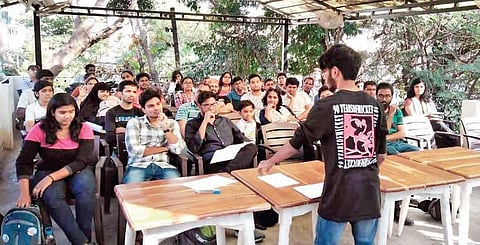

HYDERABAD: Urdu is derived from the Turkish word Ordu which means ‘military’. That’s why it is translated as ‘lashkari zubaan’ or the ‘language of the military personnel’. The reason? It had its origins in the military troops of the Mughals who spoke what was a mixture of words from Arabic, Turkish, Persian, Hindi as several of them knew a different language and used Urdu as a common language to communicate with one another. This language borrowed heavily from other languages before its several vocabularies assimilated into the dialect(s) the locals spoke. And while the purists and linguistics experts argue that a language takes several hundred years to distil and acquire the volume it carries, Urdu has come a long way from diwans of Mir and Ghalib to movie lyrics of Majrooh Sultanpuri to Gulzar, from the royal durbars of Mughals and Nizams to symposiums in the city, open mics, literature festivals, poetry recitations, YouTube channels, translations, classes for eager-to-learn adults and more. Though the sweet-sour linguistic tussle isn’t lost between North and Deccan,
Hyderabad is witnessing a rise in the love for language, especially among youngsters be it students, upcoming writers or those who enjoy the language just for the love of its richness.November 9, which is the birth date of legendary poet
Allama Iqbal, is celebrated as Urdu Day. And Hyderabad where it’s the second official language is witnessing a rise in its aficionados. Several youngsters in the city have formed groups for discussion and workshops on Urdu poetry. In October, Rekhta Foundation of the famed Jashn-e-Rekhta of Delhi organised Shaam-e-Rekhta at Jawahar Bal Bhavan, Public Gardens which brought together ‘Nasr Goi’ and ‘Mushaira’. Nasr Goi witnessed reading from literature written on Partition of Hindustan. Pranav Sharma, 26, a scientist and curator of the Space Museum at BM Birla Science Centre, Adarsh Nagar and an aficionado of Urdu was invited to read at the event. He writes ghazals in Urdu and conducts lectures and workshops on Urdu language and literature.
On November 17 he’s conducting a two-day workshop on astronomy and Urdu poetry. He shares, “When you read Allama Iqbal’s lines: ‘Sitaron ke agey jahaan aur bhi hain…’, he’s talking about the unexplored depths of the space other than the metaphorical sense. Faiz Ahmed Faiz has similar connotations in his works.” His workshops are free and entry is open to all. Shaam-e-Rekhta was organised in association with Anjuman-e-Fanaan which means a gathering of artist(e)s. It’s a local Urdu poetry group in the city. Says the founder Riasath Ali Asrar, a 20-year-old engineering graduate from MJ College, “I started it in 2018 along with fellow poet Zaki Haider.
We organise open-mics, workshops, seminars on classical Urdu poetry in different cultural spaces like Lamakaan, Nritya Forum, BM Birla Science Centre.” Soumya V, 25, a multilingual poet and a BITS Pilani graduate who works for Novartis has attended their workshops and read at their events. She says, “I began learning Urdu by reading the online archives, listening to fellow poets and attending various events. It’s engaging to sit with like-minded fellow writers and start a discussion on one another’s works without any hesitation.”
Unfortunately, the other groups of Urdu poetry in the city do not welcome young poets and focus on a similar set of poets/writers. But the youngsters don’t complain, they focus on being the bridge between the old tradition and the upcoming poets. That’s how another event ‘Hazrat Jaun Elia Aur Hum - Hyderabad Chapter’ held in August was quite a hit. It was a melange of mushaira (symposium), mausiqi (music) and guftugu (conversation) in memory of celebrated poet Jaun Elia of Pakistan.
So, have such platforms busted the myth that Urdu belongs only to people from lesser-privileged backgrounds and to the older generation? Says Dheeraj Kumar, 27, a research scholar of EFLU who practises writing in Nastaliq, the Urdu script, “The democratization of space and voice through social media and active groups has definitely busted certain misconceptions, especially the fact that Urdu belongs to ‘certain literary people’ of ‘certain cities’. It’s heartening to see the younger generation coming forward. In fact, every age has seen the interest among the youngsters, but now it is more visible, thanks to more awareness. Urdu is going to live for a very, very long time. My only fear is that not much effort is being taken to save its script. The language will anyway live, but a tehzeeb will come to an end if the script dies.”